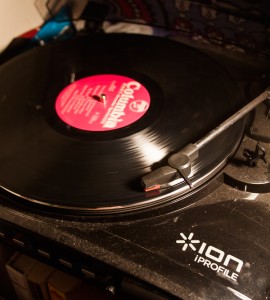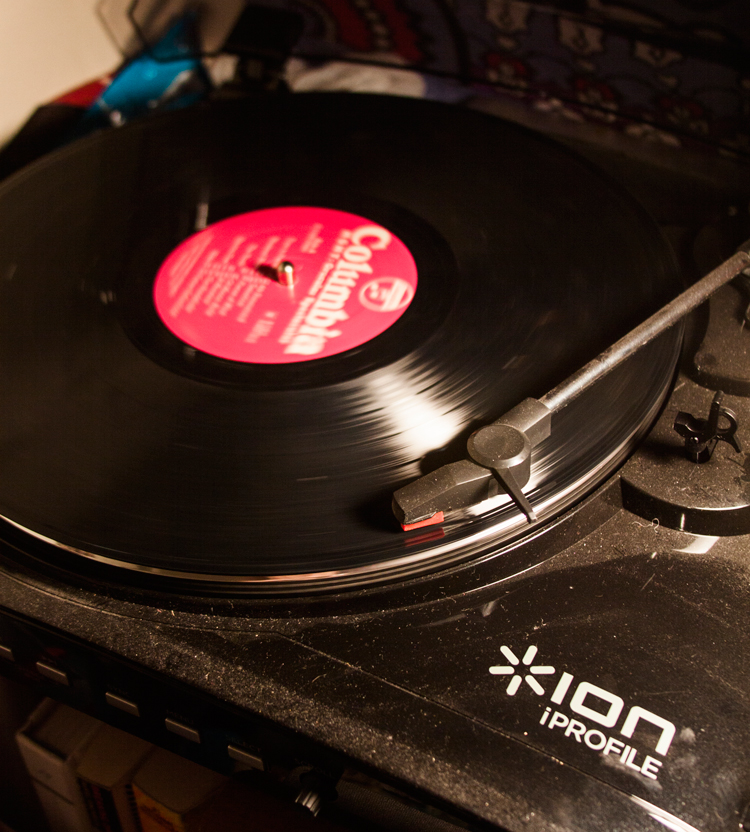By Stephen Cook

Decades ago, if you wanted to listen to music you could either turn on the radio or put on a record. Fast forward to now, when there are more listening options than ever before: iTunes, Pandora, Spotify, Grooveshark, CDs and MP3s just to name a few. In addition to these, there is traditional radio and vinyl records.
Although the general popularity of vinyl records fell during the late ‘90s and ‘00s, an era when new technologies such as CDs and MP3s became widespread, records are once again becoming more prevalent. According to a report by Nielsen SoundScan, 4.6 million LP/Vinyl Records were sold in 2012 – a 17.7 percent increase over the 3.9 million sold in 2011.
Today’s selection isn’t limited to just vintage vinyl, either. Artists such as Taylor Swift and the Black Keys are releasing brand new albums on vinyl. Amazon.com has more than 1 million vinyl records for sale, ranging from Lady Gaga to Jimi Hendrix and everything in between.
Coleen Voeks, who works at the Kansas City record store Vinyl Renaissance, has been listening to records since she was a child. Over the past 10 years, she said she has come to the point where she won’t buy anything but vinyl.
“If I’m going to sit down and actually listen to something I listen to it on vinyl,” Voeks said. “It’s more enjoyable; it’s a full experience.”
Voeks noted that although there are plenty of people who like listening to music, not all take the time to sit and appreciate the music.
“There’s the casual listener of music and then there’s people who genuinely really listen to music,” Voeks said. “I think those are the people that really are into vinyl, because you hear so much more. It’s such a better sound.”
Listening to vinyl records is not just an audible experience, it is also tactile, Voeks explained. You have to care for your records and equipment as well as set them up to play.
Carter Lewis, student, also sees records as being something real you can collect and experience.
“I started collecting them and started listening to them,” Lewis said. “I got really attached to owning them. I started collecting them more. So the past couple years, I would search out and try to find better and better records and I really like it because it’s good to have something that’s physical in your hands.”
Lewis said he has spent about $1,500 to $3,000 on his collection of records. Currently, his collection is made up of about 300 records that he inherited from his parents along with about 75 to 100 records he has purchased himself. According to Lewis, it is worth it to invest in good equipment and good records.
“There’s a warmness to it that you really don’t get out of a CD or a MP3,” Lewis said. “Also it’s a higher audio quality than regular MP3s or CDs due to analog recording.”
Joel Nanos, who runs Element Recording Studios in Kansas City, explained the recording and production process can have an effect on the final sound quality of a song. According to Nanos, analog provides a more natural way of listening to music, whereas with digital recording, the sound must be converted into digital code before being played back.
“In the old days you recorded a record. You were recording with an analog microphone into analog equipment onto tape that was being cut to vinyl,” Nanos said. “It was being pumped through analog speakers into our ears, which are analog devices, and we like that warmth and that distortion — not distortion in a bad way, but in a good way that creates that warmth and fuzz.”
Additionally, Nanos said in order for music to be made into MP3s and CDs, the audio has to be carved down to size, meaning sound quality is lost in the process. This real, natural sound quality is why he believes the interest will continue.
“I don’t think vinyl will go away, I don’t think it’ll take over the digital world,” Nanos said. “I think that will be forever the dominant form of getting music.”
Instead of putting iTunes on random or just listening to one or two songs at a time, a vinyl record makes you more likely to listen to the album all the way through, Voeks explained, as the artist intended it to be heard. It’s not as easy to skip tracks.
Nanos said although many musicians who come through his studio hope to release their music on vinyl, he estimated only about a quarter of them are able to due to budget and public interest.
“Everyone always expresses frustration when they’re in the studio and they realize after all this is done that [people won’t] hear what they created the way it was intended to be heard,” Nanos said. “Hopefully at least that small percentage [of vinyl listeners] will still be out there.”
Contact Stephen Cook, copy editor, at [email protected].






















